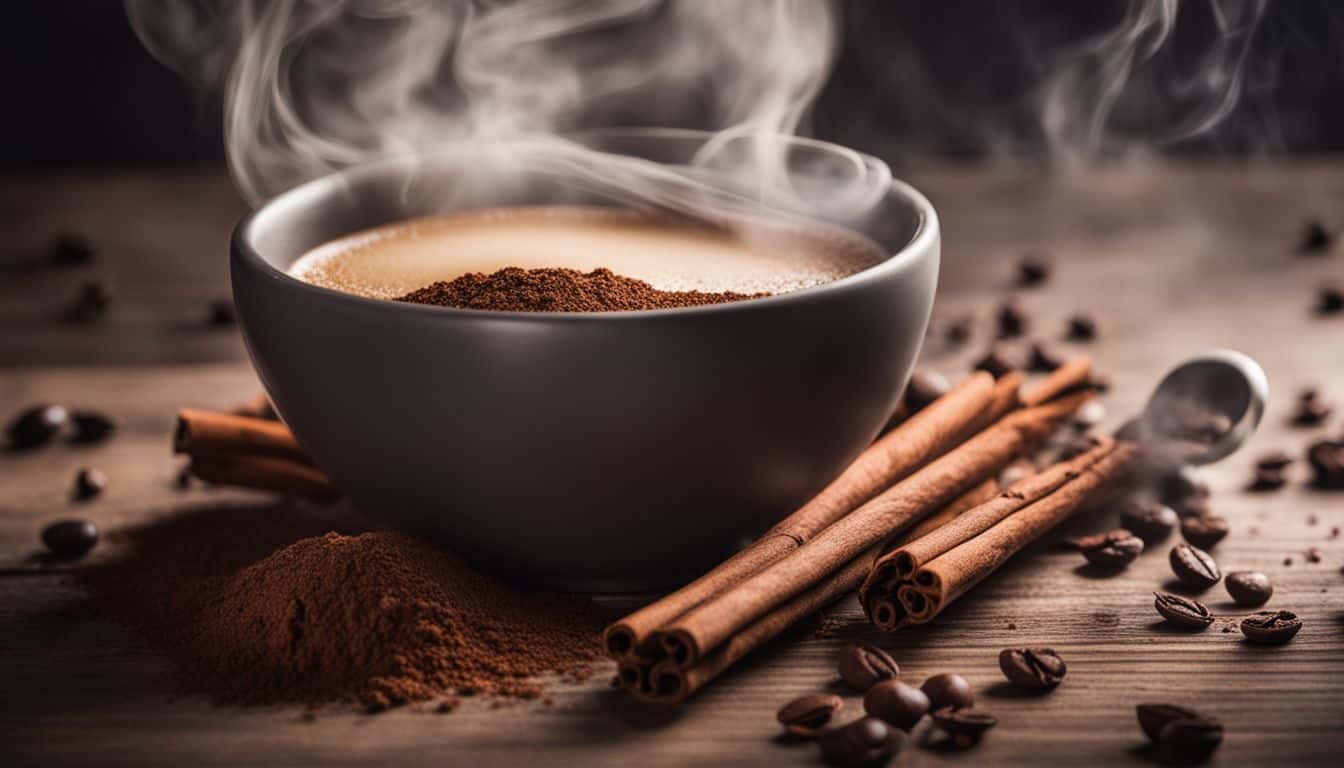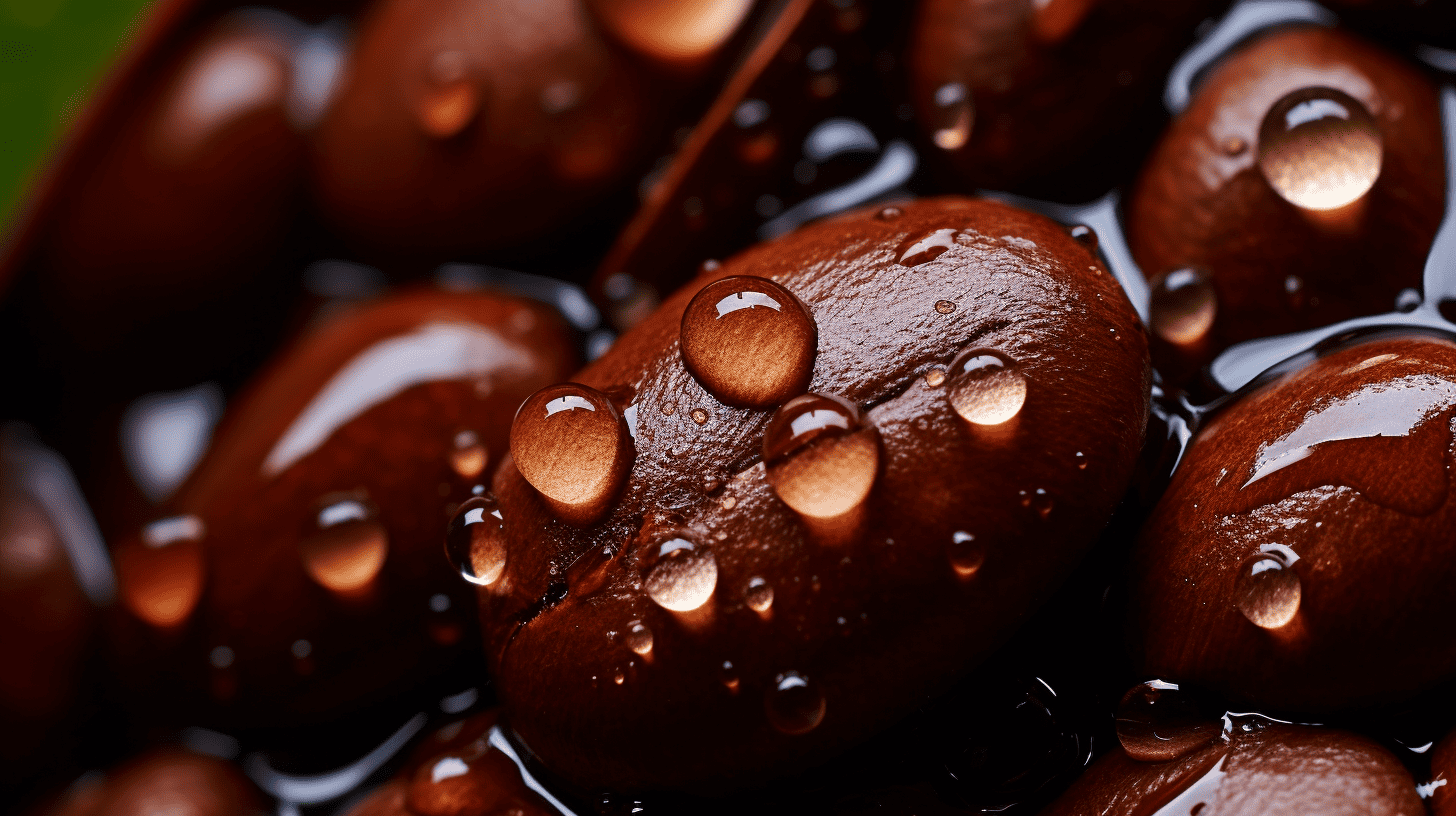Are you tired of the peculiar aftertaste that some sugar substitutes leave in your coffee? I get it, because so am I; and according to studies, artificial sweeteners often contribute to this off-putting experience. Today we will take a look at the best sugar substitute for coffee without aftertaste.
But don’t despair – there’s a multitude of healthier, tastier options out there just waiting for you to try. In this blog post, we’ll explore various natural and zero-calorie sugar alternatives that lend sweetness to your coffee without leaving an unsavory residue on your palate.
Let’s dive in!
Key Takeaways
- Stevia and monk fruit sweetener are natural sugar substitutes for coffee that don’t have an aftertaste.
- Maple syrup, coconut sugar, honey, and agave nectar can also be used as alternatives to sugar in coffee.
- Consider factors like taste, aftertaste, glycemic index (GI), and potential health benefits when choosing a sugar substitute for coffee.
- Other natural additives like cocoa powder, cinnamon, vanilla extract, or coconut milk can enhance the sweetness of your coffee.
Different Types of Sugar Substitutes for Coffee
There are several types of sugar substitutes that can be used in coffee, including maple syrup, stevia, monk fruit sweetener, coconut sugar, honey, and agave nectar.
Maple syrup
Maple syrup is a sweet treat from nature. It is not just for pancakes anymore. You can also use it in your coffee! Maple syrup gives your cup of joe a hint of caramel-like flavor. Plus, it’s a healthy option too! This natural sweetener has antioxidants that are good for you.
I love using maple syrup because it mixes well with hot drinks. Make sure to try it next time you brew a pot of coffee!
Stevia
Stevia is a natural sweetener that is often used as a sugar substitute for coffee. It comes from the leaves of the Stevia rebaudiana plant and has zero calories. One great thing about stevia is that it does not have an aftertaste or acquired taste like some other sweeteners.
It provides sweetness without any bitterness, making it a popular choice for those who want to enjoy their coffee without added sugar. Stevia can be found in both liquid and powder form, making it convenient to use in your favorite hot or cold beverages.
With its natural origin and lack of aftertaste, stevia is definitely worth considering if you’re looking for a sugar substitute for your coffee.
Monk fruit sweetener
Monk fruit sweetener is a natural sugar substitute for coffee that has gained popularity in recent years. It is made from the extract of monk fruit, which is a small melon-like fruit native to Southeast Asia.
One of the main benefits of monk fruit sweetener is that it does not contain any calories or carbohydrates, making it an excellent choice for those watching their weight or following a low-carb diet.
Additionally, it does not raise blood sugar levels and has a glycemic index of zero. Monk fruit sweetener also doesn’t leave an aftertaste like other artificial sweeteners, making it a great option for coffee lovers who want to enjoy their cup without lingering flavors.
Coconut sugar
Coconut sugar is a natural sweetener made from the sap of coconut palm trees. It has a caramel-like flavor and can be used as a sugar substitute in coffee. Coconut sugar has a lower glycemic index compared to regular table sugar, which means it causes a slower rise in blood sugar levels.
Therefore, it may be a better option for those looking to manage their blood sugar levels. Additionally, coconut sugar contains some important vitamins and minerals, such as iron, zinc, and potassium.
Overall, coconut sugar is a healthier alternative to traditional white or brown sugars when sweetening your coffee.

Honey
Honey is a natural sweetener that can be used as an alternative to sugar in coffee. It has a familiar taste and is commonly used as a sugar substitute. Honey also contains antioxidants, which can offer some health benefits.
However, it’s important to note that honey does contain calories, so if you’re looking for a calorie-free option, it may not be the best choice. Additionally, honey has a distinct flavor that can slightly alter the taste of your coffee.
Overall, honey is a good option for those who prefer natural sweeteners and don’t mind the slight change in flavor.
Agave nectar
Agave nectar is a natural sweetener that can be used as a substitute for sugar in coffee. It is made from the sap of the agave plant and has a similar taste to honey. Agave nectar is sweeter than regular sugar, so you only need to use a small amount.
It has a low glycemic index, which means it doesn’t cause your blood sugar levels to spike like regular sugar does. Agave nectar also dissolves easily in hot liquids like coffee and doesn’t leave an aftertaste.
It’s a good option if you’re looking for a natural and flavorful way to sweeten your coffee without any unpleasant side effects.
Factors to Consider for a Sugar Substitute for Coffee
When choosing a sugar substitute for coffee, there are several factors to consider. These include the taste and aftertaste of the sweetener, its glycemic index (GI), and any potential health benefits it may offer.
Taste
When it comes to choosing a sugar substitute for coffee, taste is an important factor to consider. You want your coffee to be sweet and enjoyable without any unpleasant flavors. Stevia and monk fruit extract are two great options that are known for their natural sweetness without an aftertaste.
Honey is another popular choice since it has a familiar taste and can easily replace sugar in your coffee. Each person’s preferences may vary, so it’s worth trying different options to find the best-tasting sugar substitute that suits your palate.
Aftertaste
When it comes to finding the best sugar substitute for coffee, one important factor to consider is the aftertaste. You don’t want a sweetener that leaves a strange or unpleasant taste in your mouth.
Stevia and monk fruit sweeteners are known for having no aftertaste at all, making them popular choices for coffee lovers. Maple syrup is another option that doesn’t have a lingering aftertaste and adds a unique flavor profile to your cup of joe.
So if you’re looking for a sugar substitute without any unwanted flavors sticking around, give stevia, monk fruit sweetener, or maple syrup a try in your next cup of coffee!
Glycemic Index (GI)
The Glycemic Index (GI) is a measure of how quickly a food raises your blood sugar levels. Foods with a high GI, like sugar, cause a rapid spike in blood sugar levels. On the other hand, foods with a low GI, like certain sweeteners, have a slower and steadier effect on blood sugar.
It’s important to consider the GI when choosing a sugar substitute for coffee, especially if you’re concerned about managing blood sugar levels or following a diabetic-friendly diet.
Stevia and monk fruit extract are examples of sweeteners with low or zero GI that won’t cause as much of an impact on your blood sugar compared to regular table sugar.
Health benefits
As a coffee enthusiast, you may be wondering about the health benefits of using sugar substitutes in your coffee. Well, let me tell you! Some sugar alternatives for coffee offer certain health benefits.
For example, natural maple syrup contains antioxidants that can help fight inflammation in the body. Stevia, a zero-calorie sweetener, does not have an aftertaste and is considered a healthier option compared to artificial sweeteners.
Honey, another natural sweetener commonly used as a sugar substitute in coffee, has antimicrobial properties and can soothe coughs and sore throats. So by choosing the right sugar substitute for your coffee, you can enjoy taste satisfaction and potential health benefits.
Best Sugar Substitutes for Coffee Without Aftertaste
The best sugar substitutes for coffee without aftertaste include stevia, monk fruit sweetener, maple syrup, coconut sugar, honey, and agave nectar.
Stevia
Stevia is a natural sweetener that can be used as a sugar substitute in coffee. It is made from the leaves of the stevia plant and has zero calories. One key advantage of stevia is that it does not have an aftertaste or acquired taste, making it a popular choice for those who want to enjoy their coffee without any lingering flavors.
Stevia is also considered diabetic-friendly because it does not affect blood sugar levels. If you’re looking for a healthy and convenient way to sweeten your coffee without added calories or aftertaste, stevia is definitely worth considering.
Monk fruit sweetener
Monk fruit sweetener is a natural sugar substitute for coffee that is made from the extract of monk fruit. It is an excellent choice for those who want to avoid aftertastes or unpleasant flavors in their coffee.
Monk fruit sweetener does not have any calories, making it a great option for people looking to reduce their calorie intake. Additionally, it has a low glycemic index, which means it doesn’t cause a rapid increase in blood sugar levels.
This makes it suitable for individuals with diabetes or those watching their blood sugar levels. Monk fruit sweetener is also known to contain antioxidants and may provide some health benefits.
Maple syrup
Maple syrup is a natural and tasty sugar substitute for coffee. It contains antioxidants, which can be good for your health. Maple syrup adds a sweet flavor to your coffee without leaving an aftertaste.
It is a popular choice among people who prefer natural sweeteners. So, if you want to add some sweetness to your cup of coffee, maple syrup is definitely worth trying out!
Coconut sugar
Coconut sugar is a natural sweetener that comes from the sap of coconut palm trees. It has a caramel-like flavor and can be used as an alternative to regular sugar in coffee. Coconut sugar has a lower glycemic index compared to traditional white sugar, which means it won’t cause a spike in your blood sugar levels.
It also contains small amounts of vitamins and minerals like iron, zinc, and potassium. When using coconut sugar in coffee, you may notice a slight coconut taste, but it does not have an aftertaste like some other sweeteners.
Remember to use it in moderation as it still contains calories and carbohydrates.
Honey
Honey is a natural sweetener that can be a great substitute for sugar in coffee. It has a familiar taste and is commonly used as a sugar alternative. Honey also provides some health benefits, such as antioxidants and antibacterial properties.
However, it’s important to note that honey does contain calories and carbohydrates, so if you’re watching your calorie intake or have diabetes, you should use it in moderation. Overall, honey is a tasty option to sweeten your coffee without an aftertaste.
Agave nectar
Agave nectar is a natural sweetener that can be used as a sugar substitute for coffee. It comes from the agave plant and has a mild, sweet taste. Agave nectar is known for its low glycemic index, which means it won’t cause a sharp rise in blood sugar levels.
This makes it suitable for people with diabetes or those watching their sugar intake. Agave nectar doesn’t leave an aftertaste and is easy to dissolve in hot beverages like coffee.
It’s also a good option if you’re looking for a vegan sweetener since it doesn’t come from animal sources. However, like other sweeteners, it should still be consumed in moderation due to its high fructose content.

Other Considerations for Sweetening Coffee
In addition to sugar substitutes, there are other natural additives that can enhance the sweetness of your coffee. Consider adding a dash of cocoa powder, a sprinkle of cinnamon, a drop or two of vanilla extract, or even a splash of creamy coconut milk for added flavor.
These options provide unique tastes without leaving an unpleasant aftertaste in your mouth.
Cocoa powder
Cocoa powder can be a delicious and healthy way to sweeten your coffee. It adds a rich and chocolatey flavor without the need for sugar. Cocoa powder is also packed with antioxidants, which are good for your overall health.
Just add a spoonful of cocoa powder to your coffee and stir it well until it’s completely dissolved. It’s an easy and tasty alternative that will enhance your coffee experience. Give it a try!
Cinnamon
Cinnamon is a delicious and aromatic spice that can be used as a natural sweetener for coffee. It adds a hint of warmth and sweetness to your cup of joe without the need for sugar.
Cinnamon also has health benefits, such as being rich in antioxidants and having anti-inflammatory properties. You can simply sprinkle some cinnamon powder into your coffee grounds before brewing or stir it into your brewed coffee for added flavor.
Give it a try if you’re looking for a flavorful and healthier way to sweeten your morning brew!
Vanilla extract
Vanilla extract can be a delicious and natural way to sweeten your coffee. It adds a subtle and aromatic flavor that enhances the taste of your morning brew. Unlike artificial sweeteners, vanilla extract is a natural option that doesn’t leave an aftertaste.
It’s important to note that vanilla extract does contain some sugar, so it’s not a calorie-free option like stevia or monk fruit sweetener. However, if you’re looking for a flavorful and wholesome alternative to traditional sugar, adding a dash of vanilla extract to your coffee can be a tasty choice.
Coconut milk
Coconut milk is a creamy and delicious alternative to regular milk that can be used to sweeten your coffee. It adds a subtle hint of coconut flavor and richness to your cup of joe.
Coconut milk is also lactose-free, making it a great option for those with lactose intolerance or dairy allergies. Additionally, it contains medium-chain triglycerides (MCTs), which are a type of healthy fat that may provide benefits like improved digestion and increased energy levels.
So if you’re looking for a dairy-free and flavorful way to sweeten your coffee, give coconut milk a try!
Conclusion on Best Sugar Substitute For Coffee Without Aftertaste
When it comes to finding the best sugar substitute for coffee without an aftertaste, options like stevia and monk fruit sweetener come out on top. Maple syrup, coconut sugar, honey, and agave nectar are also great alternatives.
Additionally, adding cocoa powder, cinnamon, vanilla extract or coconut milk can enhance the sweetness of your coffee without the need for sugar. Ultimately, it’s all about finding what works best for you and your taste preferences.
So go ahead and experiment until you find your perfect cup of sweetened coffee!
Are There Any Robust and Flavorful Coffee Alternatives That Don’t Require Sugar?
Looking for ultimate coffee alternatives to cafe bustelo without the need for sugar? Look no further! Whether you’re cutting down on sugar or simply exploring new flavors, there are plenty of robust and flavorful options available. From herbal teas like dandelion root or chicory blends to caffeine-free alternatives like roasted barley or cascara, these beverages offer a delicious and satisfying coffee-like experience without any added sugar.
FAQs on Best Sugar Substitute For Coffee Without Aftertaste
1. What is the best sugar substitute for coffee without an aftertaste?
Stevia is considered one of the best sugar substitutes for coffee as it has a sweet taste without any noticeable aftertaste.
2. Can I use artificial sweeteners in my coffee to avoid an aftertaste?
Yes, some artificial sweeteners like sucralose or aspartame can be used in coffee to avoid an aftertaste. However, the taste may vary depending on personal preference.
3. Are natural sweeteners a good option for avoiding an aftertaste in my coffee?
Natural sweeteners such as agave nectar or honey can be used to add sweetness to your coffee without leaving behind any unpleasant aftertaste.
4. How much sugar substitute should I use in my coffee to achieve the desired taste without an aftertaste?
The amount of sugar substitute needed varies based on individual preferences. It’s recommended to start with a small amount and gradually increase until you reach your desired level of sweetness without experiencing any unpleasant aftertaste.





Leave a Reply